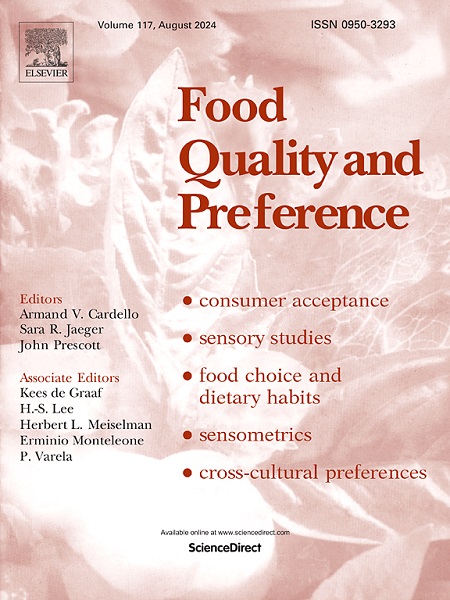Energy density of snacking episodes and eating behaviour: A systematic review of experimental studies
IF 4.9
1区 农林科学
Q1 FOOD SCIENCE & TECHNOLOGY
引用次数: 0
Abstract
Snacking episodes can be defined as food and drink that are consumed between mealtimes. Snacking episodes can differ greatly in nutrient and energy content, having the potential to influence diet quality and, in turn, health. This systematic review aimed to understand the impact that the energy density of snacking episodes has on eating behaviour outcomes. Objective outcome measures included ad libitum snack intake and daily energy intake, and subjective measures included self-assessed hunger and satisfaction. Eight databases were searched based on set inclusion and exclusion criteria to identify peer-reviewed experimental studies with adult populations. Across the ten eligible studies, seven assessed hunger, five assessed fullness, one assessed overall satiety, five assessed desire to eat/prospective food consumption, and eight assessed energy intake, ad libitum intake/compensation with respect to the impact of snacking episodes' energy density. The weight of the evidence suggested that the energy density of snacking episodes has little effect on eating behaviour outcomes, with limited evidence suggesting that higher energy density snacking episodes could result in higher satiety levels and influence fullness levels but only at specific time points. Risk of confound was high, including little control over volume and sensory characteristics across studies, particularly those reporting significant effects. Overall, this literature would benefit from using standardised snacking comparisons, to confidently identify the impacts of energy density for snacking episodes on eating behaviour outcomes. Findings could inform future studies that aim to understand the formulation of snacking episode considering energy density, to benefit diet quality whilst maintaining consumer satisfaction.
吃零食的能量密度与饮食行为:实验研究的系统回顾
零食发作可以定义为在正餐之间吃的食物和饮料。吃零食的时间在营养和能量含量上有很大的不同,有可能影响饮食质量,进而影响健康。本系统综述旨在了解吃零食的能量密度对饮食行为结果的影响。客观结果测量包括随意零食摄入量和每日能量摄入,主观测量包括自我评估的饥饿和满意度。根据设定的纳入和排除标准对8个数据库进行检索,以确定与成人人群进行同行评议的实验研究。在10项符合条件的研究中,7项评估饥饿感,5项评估饱腹感,1项评估总体饱腹感,5项评估进食欲望/预期食物消费,8项评估能量摄入,随意摄入/补偿关于零食事件能量密度的影响。证据的权重表明,吃零食的能量密度对饮食行为的结果影响不大,有限的证据表明,高能量密度的吃零食可能导致更高的饱腹感,并影响饱腹感,但仅在特定的时间点。混淆的风险很高,包括在研究中对体积和感觉特征的控制很少,特别是那些报告显着影响的研究。总的来说,这篇文献将受益于使用标准化的零食比较,以自信地确定零食事件的能量密度对饮食行为结果的影响。研究结果可以为未来的研究提供信息,旨在了解考虑能量密度的零食情节的制定,在保持消费者满意度的同时有利于饮食质量。
本文章由计算机程序翻译,如有差异,请以英文原文为准。
求助全文
约1分钟内获得全文
求助全文
来源期刊

Food Quality and Preference
工程技术-食品科技
CiteScore
10.40
自引率
15.10%
发文量
263
审稿时长
38 days
期刊介绍:
Food Quality and Preference is a journal devoted to sensory, consumer and behavioural research in food and non-food products. It publishes original research, critical reviews, and short communications in sensory and consumer science, and sensometrics. In addition, the journal publishes special invited issues on important timely topics and from relevant conferences. These are aimed at bridging the gap between research and application, bringing together authors and readers in consumer and market research, sensory science, sensometrics and sensory evaluation, nutrition and food choice, as well as food research, product development and sensory quality assurance. Submissions to Food Quality and Preference are limited to papers that include some form of human measurement; papers that are limited to physical/chemical measures or the routine application of sensory, consumer or econometric analysis will not be considered unless they specifically make a novel scientific contribution in line with the journal''s coverage as outlined below.
 求助内容:
求助内容: 应助结果提醒方式:
应助结果提醒方式:


